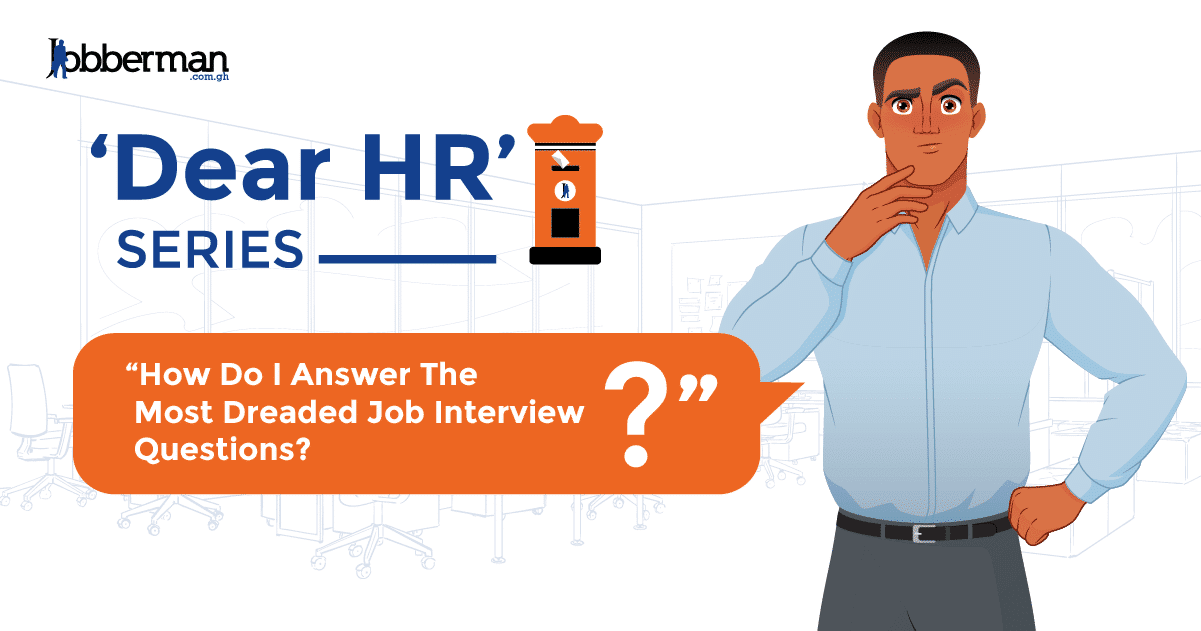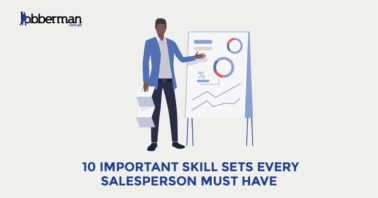Dear HR,
I am an avid reader of your series; “DEAR HR”. I must say, you are hitting the pain points of job seekers like myself.
Thank you for your advice and the job hunting tips.
Recently I read one of your articles in response to one of the most dreaded interview questions; “Why Should We Hire You?”.
That was insightful. Thank you once again.
Aside from that, I think there are other 4 major questions interviewees dread during job interviews. I will be glad if you could guide job seekers on how to answer these questions.
- Tell me about yourself?
- What’s your salary expectation?
- What are your strengths and weaknesses?
- Why are you leaving your current job?
- Do you have any questions?
Your avid reader,
Knii Lantey
Table of Contents
HR’s Response
Hello Knii Lantey,
It’s an honour to know that we are making an impact in the lives of jobseekers like you. We appreciate the time you took to express that. Thank you.
Now to your request on interview questions. As a recruitment company, we can testify to the fact that these are the very questions recruiters ask job applicants each day to make informed hiring decisions.
According to recruiters and hiring managers, interviews have proven to be one major way to determine whether a job applicant is the right fit for the job. To most recruiters, this is a conversational moment between the interviewer and applicant to assess their personality and how well their skill set match the role at hand.
Although job interviews are supposed to be conversational, this is one of the most crucial moments in the life of every job applicant. Recruiters acknowledge the fact that job interviews can be nerve-racking, yet they expect jobseekers to prepare enough for job interviews.
In a recent poll conducted by Jobberman Gh on Linkedin, it was ascertained that these are the major dreaded questions by job seekers. If you find yourself in that circle, here are smart ways to answer these questions in your next job interview.
1. Tell Me About Yourself?

This simply means walk the interviewer through your CV. Introduce yourself in a manner that will make the interviewer more interested in who you are, your experiences, your accomplishments and your career objective in relation to the job you are applying for. Ideally, this is supposed to be your professional summary. This question is always asked at the beginning of the interview. Most often the information you give here births the follow-up questions.
So your first impression counts. Be mindful of the words you use, your tone of voice, and your posture. If you have no idea of what to say, it is simply about where you are currently, your past work experiences, and what you intend to do with your skills and experiences and qualifications.
For Experienced Proffesionals
My name is Pomaa Amponsah, an experienced communication professional and a certified digital marketer, with a proven track record of improving website performance through content marketing.
I have excellent copywriting skills, I am a creative thinker, a problem-solver and I am commercially aware. With my current employer, I have been able to use my set skills to develop content that addresses the pain points of customers which have led to an increase in conversion rate from 56% to 83% within one year.
I believe with my skills and experience, I will be of great value to your company and I am ready to make a significant impact when hired.
If you are fresh from school you can say:
“My name is Pomaa Amponsah and I hold a Bachelors degree in Communications Studies. I am dedicated, self-motivated, creative, a fast learner and able to adapt to new environments.
In my final year, I worked on a project which relates to the role I am interviewing for and I believe when given the opportunity, my knowledge and skills will help your business grow.”
2. Why are You Leaving Your Current Job?

At this point, your interviewer expects an honest answer but do not be pushed to spill out your dissatisfaction with your current employer. Avoid being negative. Just remain positive about the future and your next opportunities.
This question is usually used to test how well you can handle sensitive situations. Remember you are selling your personality and skills. So be careful not to land yourself in trouble in the quest of presenting yourself as the best candidate.
3. What is Your Salary Expectation?

Every job comes with a certain compensation or monetary benefits. As a job applicant, it is your responsibility to research your industry for information on the average salary and experience level for the role you are interviewing for.
Most often, recruiters would ask you this question during the phone screening process. When this happens it indicates that the employer has a specific budget for the role. They, therefore, inquire from shortlisted candidates their expectations. If a higher number of the applicants mentions a higher salary then it informs the employer whether to adjust the budget for the role or not.
At this point of the interview, you need to exhibit your negotiation skills. Your answer will determine how much you are worth your skills and experience. Make sure to do your research in order not to sell yourself short.
Consider your skills, years of experience, and qualifications before you state a specific amount. Also be ready to enquire from the employer if there are any non-monetary benefits/ allowances like health care, educational support, career development among others. Remember, money is good, yet sometimes, non-monetary benefits offered by companies pay off.
You can download a report on salaries conducted by jobberman for more insight on salaries here.
4. What are Your Strengths and Weaknesses?

Your strengths are specifically what makes you the ideal fit for the job. And your weaknesses are the traits that hinder your progress on the job.
This question is for the recruiter to check how self-conscious you are and how relevant these strengths contribute to your success on the job.
If you are interviewing for a sales role, you can, for instance, indicate that you have excellent negotiation skills, you have a pleasant personality, and are very persuasive. Always tailor your answer to suit the role you are interviewing for.
With regards to your weakness, be honest. This does not guarantee you not being considered. This is to let the hiring manager or recruiter be aware of the challenges you may encounter as a result of your weakness.
So you need to study yourself or better still ask close friends or colleagues to give you an honest assessment of your strengths and weaknesses.
This will go a long way to help build on your strengths while you improve on your weaknesses.
5. Do You Have Any Question For Us?

Most often this is the final question interviewers ask job applicants. Surprisingly, whether out of fear or nervousness, most applicants say “NO”.
This should never be the case. At least prepare a question to ask the interviewer. This shows that you are excited about the role and much interested in the business.
You should ask questions that relate to the job, organizational culture, and employee well-being (eg: in the period of the pandemic).
Preparing your interview questions:
We have also compiled a list of common interview questions and suitable responses to give you an idea of how to answer these questions. We do not encourage you to cram the responses to these interview questions, but to use the insights in these responses to create your own responses.
Here you go.
1. How did you hear about the position?
This is an opportunity for you to show your interest in the company and it’s activities. Feel free to point out that you have been following the company in news and social media for sometimes. You can even cite a recent media item that covered the company. If you got information from an insider in the company, name drop that person.For example, you could say something like this “I am keenly interested in the financial sector and I do follow a couple of banking institutions, specifically XYZ bank on social media. When I saw the job listing appear on my newsfeed, I jumped at the opportunity and applied”.
2. What do you know about the company?
Don’t be tempted to read the “About” page on the company website and recite it back to them. The interviewer by this question is trying to find out if you know anything about the company’s mission and vision, their culture and ideals. How much do you care about the company? How passionate are you about what the company does. If the company is very active in Corporate Social Responsibility, you must definitely mention that and state how that ties into your personal values.
3. Why do you want this job?
If you don’t know why you’re applying for a particular job, it’s probably not a good idea to honour the call to interview. Quite frankly, who wants to hire someone who wants a job just for the sake of a job? Your response to this question should be well prepared and rehearsed. First, identify all the things that make the job a great fit for you. For example, you like helping people solve their problems so you’re naturally drawn towards customer service, or you like to play with numbers and analyse data, so you want to work in Business Intelligence.
4. Why should we hire you?
This is another tricky question. What the interviewer wants to find out is whether you possess the qualities that make you an exact fit for the job. This is, therefore, an opportunity to sell yourself big time. Remember, you must show the interviewer what differentiates you from the others. Can you deliver results? Will you fit into the company culture? Can you work in a team?. For example, you could say something like “In my previous jobs I worked with multi-cultural teams across Africa, and I am the only person in my team to take a professional course in corporate sales to help me sell to top tier clients. I know team building and top selling skills are key requirements for success in this job and I have them both“
5. What is your greatest professional achievement?
Here again, an opportunity to blow your own trumpet. No need for humility here. Demonstrate your track records of achieving results. Make it more dramatic by citing instances where you managed with very limited resources but got more than proportionate results. Concentrate on the nuances i.e describe circumstances and what you actually did. The central role you played in achieving results or averting a crisis. You could say for example, “In 3 months, I introduced a stock recording software, reduced missing stock problems by 33%”
6. Tell me about a challenge or conflict you’ve faced at work, and how you dealt with it.
What the interviewer wants to find out is how you will respond to conflict. The interview is so short a time to judge people’s character. The real deal here is to find out your tolerance level. Again, give a scenario of conflict at the workplace (confrontation with a bitter colleague, or conflict over responsibilities with another colleague), and how you professionally handled or dealt with the situation. Are you the win-it-all type or the compromising type?
7. Where do you see yourself in five years?
This question is meant to test your future career goals and whether they are in tune with the company’s. Basically, the interviewer wants to find out;
- Your career expectations
- Your ambitions
- if the position is in sync with your personal growth and goals.
Think strategically about where the position can take you and frame your answer along those lines.
8. What’s your dream job?
Again, the interviewer wants to know whether this role is in line with your career goals. While “a Hip Hop star” might get your interviewers cracking, a better approach is to talk about your goals and ambitions—and why this job role will help you to achieve them.
9. What other companies are you interviewing with?
Some companies ask this question in order to find out which competitor is after your talent, and whether you are serious about the industry. It is best to mention that you are checking out a number of similar positions in the industry. For example, you might say ‘I am currently checking out and applying to several positions in the service industry that will give me the opportunity to leverage technology to improve customer acquisition and retention.’”
10. Why are you leaving your current job?
This is a tough one, but expect it to be asked by almost all employers. Be positive about it. No need to ‘bad mouth’ your current or former employer. Show that you’re all for growth and self-development and are willing to take opportunities. For example, “I feel I have outgrown my current position and need a more challenging role to unleash my creativity.” And if you were fired, you can simply be honest about it and say “I was let go”. However be sure a followup question will follow and you should be ready to give the reason why you were fired.
11. What are you looking for in a new position?
These basically are the same things that the position you’re interviewing for has to offer. For example, you can say “I am looking forward to a role that allows creativity and gives room for personal growth and development”
12. What type of work environment do you prefer?
Be smart enough to describe one that’s similar to the environment of the company you’re applying to. Example “I prefer to work in high-performance environments and a company culture that allows risk-taking, continuous experimentation and a casual dress code”
13. What’s a time you exercised leadership?
Depending on the key requirements of the job, you may want to select an example that highlights your project management skills ( For e.g leading a project end to end) or one that shows your ability to confidently and effectively rally a team. Give a scenario of when you showed leadership and how that helped in achieving a goal or helped avoid an unpleasant situation.
14. What’s a time you disagreed with a decision that was made at work?
Disagreeing with your boss from time to time is pretty normal and good for the team performance. However, don’t create a scenario that portrays your boss as the uncompromising jerk. It could be a case where your boss did not have the full picture of something and you disagreed and proved your points with hard data or facts.
15. How would your boss and co-workers describe you?
Be honest here. This is also an opportunity to highlight strengths that you have not made mention of in the interview. Also take note of compliments from colleagues in the workplace and use those to describe yourself. Example, your ability to talk someone out of something, or to bring smiles to people’s faces.
16. Why was there a gap in your employment?
Gaps may appear in your CV if you’ve been unemployed for a while. Be frank about it. You can fill that in with positive activities you undertook whites unemployed. For example, you volunteered within the period, or you set up a blog you filled with content or took up pro-bono teaching. If you took some online courses, point that out. After that, show your readiness to take on the job and give off your best.
17. Can you explain why you changed career paths?
Sometimes you need to re-invent yourself or do what you were really born to do. Honestly show the interviewer the real reason why you changed your career. Then do a good job of relating how past experiences relate to the current role and how it gives you an advantage. Remember, experiences don’t always have to have a direct connection with the new role. Your ability to make seemingly irrelevant experiences seem relevant to a role is what makes an impressive candidate.
18. How do you deal with pressure or stressful situations?
Prepare a response that shows that you can absorb a stressful situation head-on in a positive manner. You could say that “Stressful situations often tests the limits of my productivity but just like regular physical exercise, it only makes me stronger, and more determined.” Another great approach is to walk the interviewer through your distressing tactics (taking 10 minutes walks, 15 minutes meditation etc)
19. What are your salary requirements?
The #1 rule here is to do a thorough research on the going salary for that role, in that industry. In Ghana and Africa as a whole, such information is hard to come by. However, I believe asking the right people will give you an idea of the range of salary. Another smart thing to do is go to jobs websites like Jobberman and search for a similar role. Most jobs listings display the salary range. It is recommended you state the highest amount in that range. Unless you possess a kind of a rare skillset, the employer will often want to negotiate down. Know your worth, and negotiate in your interest. What you negotiate for is what you get. You won’t be able to re-negotiate this easily once you pick up the job.
20. What do you like to do outside of work?
The interviewer basically wants a peep into your social life and your personality, whether you fit into the company culture. Keep it semi-professional. For example, saying you binge late into the night on Sunday evenings isn’t a particularly good response as that will mean low performance on Monday mornings since you will likely be suffering from a hangover.
21. How many tennis balls can you fit into a limousine?
1,000? 10,000? 100,000? Seriously?
Sometimes, you might get a brain teaser questions like the above, especially in quantitatively related jobs. In most cases, the interviewer doesn’t want exact answers, but want to know your approach and thought process. Be free to ask for a pen and paper and rack your brain.
22. What do you think we could do better or differently?
This question is commonly asked at startups. Hiring managers typically want people who can think critically at issues and offer alternative perspectives . As a rule of thumb, before you appear for any interview, you should have listed a few new or creative things you would love to implement. Think through things like “How would customer churn be reduced?” “How can productivity be boosted with limited budget and resources?” Don’t be afraid to share “crazy” thoughts about improving systems or processes. Startups love those.
23. Do you have any questions for us?
This is an opportunity to ask a job-role-specific question and also questions about the long-term vision of the company. You can also ask questions concerning welfare plan and opportunities for self-improvement. Even though you can ask questions concerning salary and remuneration, it is advisable not to dwell too much on that as you may be sending a wrong signal, such as being solely motivated by money.
Go prepared with a few questions, 2 or 3 questions are ok.
More questions to practice.
Behavioural Interview Questions:
- What was the last project you headed up, and what was its outcome?
- Give me an example of a time that you felt you went above and beyond the call of duty at work.
- Can you describe a time when your work was criticised?
- Have you ever been on a team where someone was not pulling their own weight? How did you handle it?
- Tell me about a time when you had to give someone difficult feedback. How did you handle it?
- What is your greatest failure, and what did you learn from it?
- What irritates you about other people, and how do you deal with it?
- If I were your supervisor and asked you to do something that you disagreed with, what would you do?
- What was the most difficult period in your life, and how did you deal with it?
- Give me an example of a time you did something wrong. How did you handle it?
- What irritates you about other people, and how do you deal with it?
- Tell me about a time where you had to deal with conflict on the job.
- If you were at a business lunch and you ordered a rare steak and they brought it to you well done, what would you do?
- If you found out your company was doing something against the law, like fraud, what would you do?
- What assignment was too difficult for you, and how did you resolve the issue?
- What’s the most difficult decision you’ve made in the last two years and how did you come to that decision?
- Describe how you would handle a situation if you were required to finish multiple tasks by the end of the day, and there was no conceivable way that you could finish them.
Salary Questions:
- What’s your salary history?
- If I were to give you this salary you requested but let you write your job description for the next year, what would it say?
Career Development Questions:
- What are you looking for in terms of career development?
- How do you want to improve yourself in the next year?
- What kind of goals would you have in mind if you got this job?
- If I were to ask your last supervisor to provide you additional training or exposure, what would she suggest?
Getting Started Questions:
- How would you go about establishing your credibility quickly with the team?
- How long will it take for you to make a significant contribution?
- Brainteaser Questions:
- How many times do a clock’s hands overlap in a day?
- How would you weigh a plane without scales?
- Tell me 10 ways to use a pencil other than writing.
- Sell me this pencil.
- Why is there fuzz on a tennis ball?
- If you could choose one superhero power, what would it be and why?
- With your eyes closed, tell me step-by-step how to tie my shoes.
Remember, to pay attention to your body language, choice of words, and tone of voice. We hope these tips will be of great help. Now, go smash your next job interview like a pro.
Was this helpful? Feel free to share with that friend who needs to see this.
Do you also have any question for HR? Send it to JOBBERMAN GHANA on WhatsApp.





